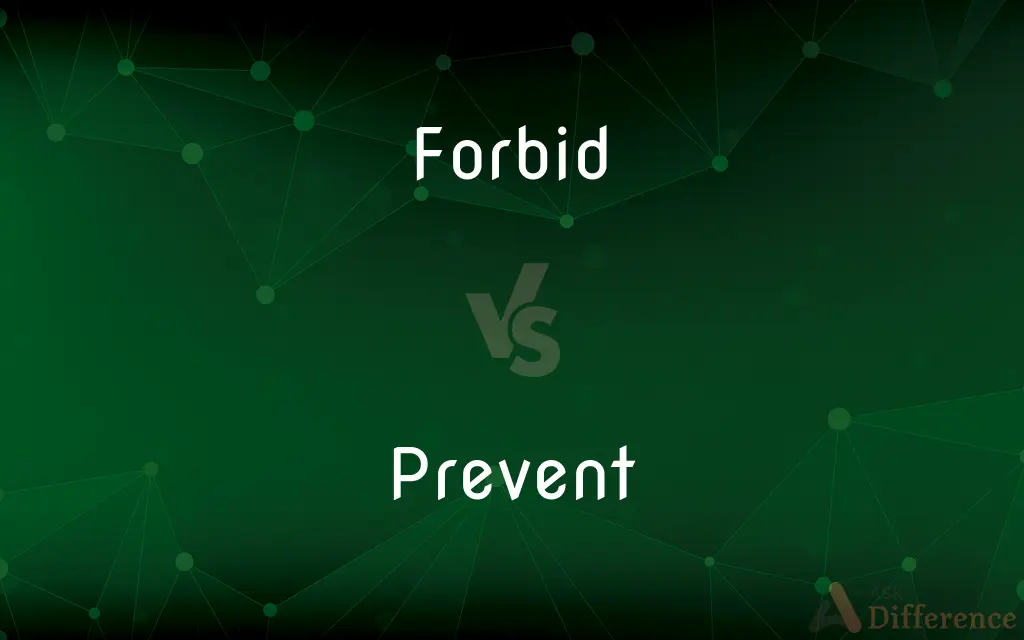Forbid vs. Prevent — What's the Difference?
By Maham Liaqat & Fiza Rafique — Updated on May 4, 2024
Forbid implies an authoritative prohibition, often legally or morally based; prevent involves measures to stop an action or outcome from occurring.

Difference Between Forbid and Prevent
Table of Contents
ADVERTISEMENT
Key Differences
Forbid is typically used in contexts where authority or laws explicitly prohibit certain actions. It often carries a strong moral or legal implication, suggesting that the forbidden action is not just discouraged but officially disallowed. Prevent, on the other hand, is more general and involves stopping something from happening, either through proactive measures or by creating barriers.
Forbid can be enforced through rules or commands, particularly in formal or institutional settings. It emphasizes the power of authority to restrict certain behaviors. Whereas prevent focuses on the mechanics of stopping an event or action, regardless of authority, often by addressing the causes or conditions leading to a situation.
The nature of forbid is inherently authoritative, often seen in legal, religious, or parental contexts. It can create a psychological barrier as much as a physical or legal one. On the other hand, prevent is more about practical measures and can be applied in any context, like health, safety, or environmental protection, where steps are taken to avert certain outcomes.
Forbid often leads to legal or social penalties if the prohibition is violated, which underscores its severity and formal nature. In contrast, the emphasis with prevent is more on the avoidance of negative outcomes rather than on punitive measures following the breach of a prohibition.
Forbid resonates with a direct command or decree that must be followed, thus it’s less flexible. Prevent is adaptable and often involves planning or strategies to avert undesirable scenarios, making it a more dynamic and often preventative approach.
ADVERTISEMENT
Comparison Chart
Context
Legal, moral, or authoritative
General safety, health, or strategic planning
Implication
Prohibition enforced by authority
Action taken to stop something from happening
Flexibility
Less flexible, as it is a direct prohibition
More flexible, involves strategies and methods
Outcome
Often involves penalties if disobeyed
Focuses on avoidance of negative outcomes
Psychological Impact
Creates a barrier or fear of consequence
Encourages proactive measures and planning
Compare with Definitions
Forbid
To command someone not to do something.
Her mother forbade her from staying out late.
Prevent
To hold back or hinder.
Bad weather prevented their flight from arriving on time.
Forbid
Express prohibition against something.
The sign clearly forbids parking in front of the gate.
Prevent
To act ahead of something in order to stop it.
They gave out free flu shots to prevent the outbreak.
Forbid
To make impossible; preclude.
The narrow entrance forbids the entry of large vehicles.
Prevent
To keep something from being done or used.
The security system prevents unauthorized access.
Forbid
To deny or exclude.
Entry is forbidden to unauthorized personnel.
Prevent
To stop something from happening or arising.
Wearing helmets can prevent serious head injuries.
Forbid
Officially prohibit something by authority or law.
The law forbids texting while driving.
Prevent
To anticipate and counteract something.
Taking vitamin C is believed to prevent colds.
Forbid
To command (someone) not to do something
I forbid you to go.
Prevent
Keep (something) from happening
Action must be taken to prevent further accidents
Forbid
To command against the doing or use of (something); prohibit
Forbid smoking on trains.
Prevent
(of God) go before (someone) with spiritual guidance and help.
Forbid
To have the effect of preventing; preclude
Discretion forbids a reply.
Prevent
To keep from happening; avert
Took steps to prevent the strike.
Forbid
(transitive) To disallow; to proscribe.
Smoking in the restaurant is forbidden.
Prevent
To keep (a person or thing) from doing something; impede
Prevented us from winning.
Prevented the disease from spreading.
Forbid
(ditransitive) To deny, exclude from, or warn off, by express command.
Prevent
To anticipate or counter in advance.
Forbid
(transitive) To oppose, hinder, or prevent, as if by an effectual command.
An impassable river forbids the approach of the army.
Prevent
To come before; precede.
Forbid
To accurse; to blast.
Prevent
To present an obstacle
There will be a picnic if nothing prevents.
Forbid
To defy; to challenge.
What part of "no" do you forbid to understand?
Prevent
(transitive) To stop (an outcome); to keep from (doing something).
I brush my teeth regularly to prevent tooth decay.
Forbid
To command against, or contrary to; to prohibit; to interdict.
More than I have said . . . The leisure and enforcement of the timeForbids to dwell upon.
Prevent
To take preventative measures.
Forbid
To deny, exclude from, or warn off, by express command; to command not to enter.
Have I not forbid her my house?
Prevent
To come before; to precede.
Forbid
To oppose, hinder, or prevent, as if by an effectual command; as, an impassable river forbids the approach of the army.
A blaze of glory that forbids the sight.
Prevent
To outdo, surpass.
Forbid
To accurse; to blast.
He shall live a man forbid.
Prevent
To be beforehand with; to anticipate.
Forbid
To defy; to challenge.
Prevent
To go before; to precede; hence, to go before as a guide; to direct.
We which are alive and remain unto the coming of the Lord shall not prevent them which are asleep.
We pray thee that thy grace may always prevent and follow us.
Then had I come, preventing Sheba's queen.
Forbid
To utter a prohibition; to prevent; to hinder.
Prevent
To be beforehand with; to anticipate.
Their ready guilt preventing thy commands.
Forbid
Command against;
I forbid you to call me late at night
Mother vetoed the trip to the chocolate store
Prevent
To intercept; to hinder; to frustrate; to stop; to thwart.
Perhaps forestalling night prevented them.
Forbid
Keep from happening or arising; have the effect of preventing;
My sense of tact forbids an honest answer
Prevent
To come before the usual time.
Strawberries . . . will prevent and come early.
Prevent
Keep from happening or arising; have the effect of preventing;
My sense of tact forbids an honest answer
Prevent
Prevent from doing something or being in a certain state;
We must prevent the cancer from spreading
His snoring kept me from falling asleep
Keep the child from eating the marbles
Common Curiosities
Can forbidding something be a form of prevention?
Yes, forbidding an action can serve as a preventive measure by stopping someone from engaging in it.
What does it mean to forbid someone?
To forbid someone means to officially prohibit them from doing something through authority or command.
Can prevention be achieved without direct intervention?
Yes, prevention can be passive, such as design features that naturally prevent accidents.
Which is more severe, forbidding or preventing?
Forbidding is often more severe as it involves authority and potential penalties for non-compliance.
Is prevent more proactive than forbid?
Yes, prevent is generally more proactive, focusing on measures taken in advance to stop something from happening.
Is preventing always about stopping negative outcomes?
Generally, prevention aims to stop negative outcomes, though it may also involve proactive strategies for promoting positive results.
Can something be prevented without being explicitly forbidden?
Yes, actions can be prevented through measures that do not necessarily involve explicit prohibitions.
Are there situations where forbidding can lead to prevention?
Yes, forbidding certain behaviors can prevent associated risks or consequences, such as forbidding smoking to prevent health issues.
What is the difference between a preventive measure and a prohibition?
A preventive measure aims to stop an outcome proactively, while a prohibition is a command that prevents an action by forbidding it.
Can technology be used to prevent but not forbid?
Yes, technology like alarms and monitoring systems can prevent incidents without forbidding actions directly.
How do laws forbid actions?
Laws forbid actions by explicitly prohibiting them and setting penalties for violations.
What roles do authority figures play in forbidding?
Authority figures enforce prohibitions and ensure compliance, often backed by legal or moral standards.
What are common methods of prevention?
Common methods of prevention include education, barriers, safety protocols, and health interventions.
What psychological effects does forbidding have?
Forbidding can create a psychological barrier or fear of consequences, which can deter behavior.
Share Your Discovery

Previous Comparison
Fiber vs. Fibril
Next Comparison
Kent vs. EssexAuthor Spotlight
Written by
Maham LiaqatCo-written by
Fiza RafiqueFiza Rafique is a skilled content writer at AskDifference.com, where she meticulously refines and enhances written pieces. Drawing from her vast editorial expertise, Fiza ensures clarity, accuracy, and precision in every article. Passionate about language, she continually seeks to elevate the quality of content for readers worldwide.
















































